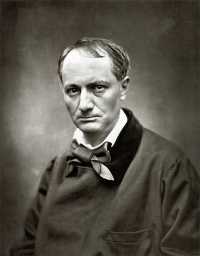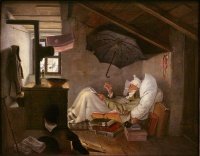Poetry
From The Art and Popular Culture Encyclopedia

|
"Poetry is playing with language: on the one hand playing with form, on the other with meaning."--Sholem Stein "Ut pictura poesis" -- Horace "If poets may be divided into two exhaustive but not exclusive classes, — the gods of harmony and creation, the giants of energy and invention, — the supremacy of Shakespeare among the gods of English verse is not more unquestionable than the supremacy of Jonson among its giants."--A Study of Ben Jonson (1889) by Algernon Charles Swinburne "(Philosophy is) the yelping hound howling at her lord (poetry) [...] " --Plato, The Republic Les dents, la bouche. --"Les dents, la bouche" (1900) by Jean-Pierre Brisset (1837 - 1919) "Who of us has not dreamed, on ambitious days, of the miracle of a poetic prose: musical, without rhythm or rhyme; adaptable enough and discordant enough to conform to the lyrical movements of the soul, the waves of revery, the jolts of consciousness?" --À Arsène Houssaye" (1869) by Charles Baudelaire |

... I found
A thing to do, and all her hair
In one long yellow string I wound
Three times her little throat around,
And strangled her.
--"Porphyria's Lover (1834) - Robert Browning
|
Related e |
|
Featured: |
Poetry (from the Greek poiesis — ποίησις — meaning a "making"; more narrowly, the making of poetry) is a form of literary art which uses aesthetic and rhythmic qualities of language—such as phonaesthetics, sound symbolism, and metre—to evoke meanings in addition to, or in place of, the prosaic ostensible meaning.
Poetry has a long history, dating back to the Sumerian Epic of Gilgamesh. Early poems evolved from folk songs, or from a need to retell oral epics, as with the Sanskrit Vedas, Zoroastrian Gathas, and the Homeric epics, the Iliad and the Odyssey. Ancient attempts to define poetry, such as Aristotle's Poetics, focused on the uses of speech in rhetoric, drama, song and comedy. Later attempts concentrated on features such as repetition, verse form and rhyme, and emphasized the aesthetics which distinguish poetry from more objectively-informative, prosaic forms of writing. From the mid-20th century, poetry has sometimes been more generally regarded as a fundamental creative act employing language.
Poetry uses forms and conventions to suggest differential interpretation to words, or to evoke emotive responses. Devices such as assonance, alliteration, onomatopoeia and rhythm are sometimes used to achieve musical or incantatory effects. The use of ambiguity, symbolism, irony and other stylistic elements of poetic diction often leaves a poem open to multiple interpretations. Similarly, metaphor, simile and metonymy create a resonance between otherwise disparate images—a layering of meanings, forming connections previously not perceived. Kindred forms of resonance may exist, between individual verses, in their patterns of rhyme or rhythm.
Some poetry types are specific to particular cultures and genres and respond to characteristics of the language in which the poet writes. Readers accustomed to identifying poetry with Dante, Goethe, Mickiewicz and Rumi may think of it as written in lines based on rhyme and regular meter; there are, however, traditions, such as Biblical poetry, that use other means to create rhythm and euphony. Much modern poetry reflects a critique of poetic tradition, In today's increasingly globalized world, poets often adapt forms, styles and techniques from diverse cultures and languages.
Satire
Poetry can be a powerful vehicle for satire. The punch of an insult delivered in verse can be many times more powerful and memorable than that of the same insult, spoken or written in prose. The Romans had a strong tradition of satirical poetry, often written for political purposes. A notable example is the Roman poet Juvenal's satires, whose insults stung the entire spectrum of society.
The same is true of the English satirical tradition. Embroiled in the feverish politics of the time and stung by an attack on him by his former friend, Thomas Shadwell (a Whig), John Dryden (a Tory), the first Poet Laureate, produced in 1682 Mac Flecknoe, one of the greatest pieces of sustained invective in the English language, subtitled "A Satire on the True Blue Protestant Poet, T.S." In this, the late, notably mediocre poet, Richard Flecknoe, was imagined to be contemplating who should succeed him as ruler "of all the realms of Nonsense absolute" to "reign and wage immortal war on wit."
Another master of 17th-century English satirical poetry was John Wilmot, 2nd Earl of Rochester. He was known for ruthless satires such as "A Satyr Against Mankind" (1675) and a "A Satyr on Charles II."
Another exemplar of English satirical poetry was Alexander Pope, who famously chided critics in his Essay on Criticism (1709). Dryden and Pope were writers of epic poetry, and their satirical style was accordingly epic; but there is no prescribed form for satirical poetry.
The greatest satirical poets outside England include Poland's Ignacy Krasicki, Azerbaijan's Sabir and Portugal's Manuel Maria Barbosa du Bocage, commonly known as Bocage.
See also
- Ut pictura poesis
- Beast poetry
- Concrete poetry
- Cult poetry
- Love poetry
- Jazz poetry
- Juxtapoetry
- Prose poetry
- Theory of poetry



